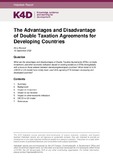| dc.contributor.author | Boustati, Alma | |
| dc.date.accessioned | 2022-10-07T12:11:38Z | |
| dc.date.available | 2022-10-07T12:11:38Z | |
| dc.date.issued | 2022-09-16 | |
| dc.identifier.citation | Boustati, A. (2022). The Advantages and Disadvantage of Double Taxation Agreements for Developing Countries. K4D Helpdesk Report. Institute of Development Studies. DOI: 10.19088/K4D.2022.143 | en |
| dc.identifier.uri | https://opendocs.ids.ac.uk/opendocs/handle/20.500.12413/17695 | |
| dc.description.abstract | When a developing and a developed country sign Double Taxation Agreements (DTAs), its generally the case that the developing country is the one that forgoes some of its tax revenues (Braun & Fuentes, 2016). Nevertheless, developing countries enter these agreements on the assumption that this will have enough economic benefits to offset these losses (Neumayer, 2007). Besides alleviating the burden of double taxation, DTAs also have the added value of improving exchange of information, which helps combat tax evasion and avoidance (Barthel et al., 2009).
One of the incentives for signing DTAs for developing countries is the increase in Foreign Direct Investments (FDIs) (Neumayer, 2007). The evidence from the literature on the link between signing DTAs and increasing FDIs is very mixed, with some finding a positive impact and others finding no impact (Quak & Timmis, 2018). However, the literature points to some clear factors that drive the relationship between FDIs and DTAs.
There are also studies that attempt to quantify the tax revenue loss of developing countries when they enter DTAs. All the studies find substantial negative loss, although most do not account for the potential benefit of increased FDIs (ActionAid, 2016; IMF, 2014; Janský & Šedivý, 2018; McGauran, 2013; Van de Poel, 2016).
There are also other reasons for why developing countries may still commit to negotiate and enter DTAs even when the benefits are not guaranteed. This includes increasing diplomatic ties with the treaty partner and the incentive of receiving foreign aid (Braun and Zagler, 2017). The other is a prisoner’s dilemma situation.
The two most prevalent DTA conventions are the OECD Model and the UN Model. The UN Model tends to be more advantageous for developing countries compared to the OECD Model (Eyitayo-Oyesode, 2020). There are many issues over which the UN Committee’s expert members from developed and developing countries disagree but developed country member are better at influencing decisions. Finally, the OECD Model is updated more frequently, resulting in the UN one being comparatively out of date (Hearson, 2015; Quak & Timmis, 2018).
Generally, the literature on the impact of DTAs on developing countries’ economies is extensive. This is especially the case for the impact of DTAs on FDIs as well as on tax revenue loss. However, because of the complexity of these issues, many of the empirical studies inevitably suffer from methodological issues that make conclusive claims very difficult. Notably missing from the literature is the impact of DTAs on international trade. | en |
| dc.description.sponsorship | Foreign, Commonwealth and Development Office (FCDO) | en |
| dc.language.iso | en | en |
| dc.publisher | Institute of Development Studies | en |
| dc.relation.ispartofseries | K4D Helpdesk Report;1212 | |
| dc.rights.uri | https://www.nationalarchives.gov.uk/doc/open-government-licence/version/3/ | en |
| dc.subject | Economic Development | en |
| dc.subject | Finance | en |
| dc.title | The Advantages and Disadvantage of Double Taxation Agreements for Developing Countries | en |
| dc.type | Helpdesk | en |
| dc.rights.holder | © Crown copyright 2022 | en |
| dc.identifier.doi | 10.19088/K4D.2022.143 | |
| dcterms.dateAccepted | 2022-09-16 | |
| rioxxterms.funder | Default funder | en |
| rioxxterms.identifier.project | K4D | en |
| rioxxterms.version | VoR | en |
| rioxxterms.versionofrecord | 10.19088/K4D.2022.143 | en |
| rioxxterms.funder.project | 42a141a4-4b80-406f-9c57-3bb186f136c1 | en |

